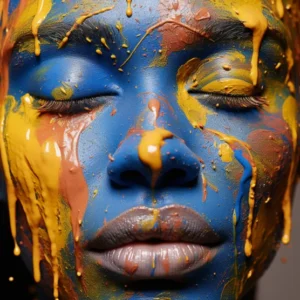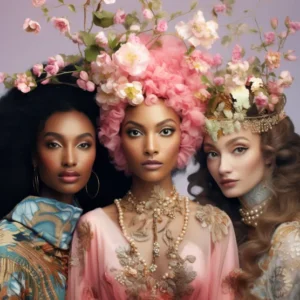In the realm of beauty, makeup is often seen as a tool for enhancing physical appearance. However, its impact goes beyond the surface, extending into the intricate domains of mental health. This comprehensive exploration delves into the therapeutic benefits of makeup, unraveling the ways in which this seemingly cosmetic practice can positively influence mental well-being. From the meditative aspects of application to its role in fostering self-esteem, the article navigates the multifaceted relationship between makeup and mental health.
The Psychology of Beauty
To understand the therapeutic benefits of makeup, it’s crucial to delve into the psychology of beauty. This section explores how societal beauty standards, self-perception, and external influences contribute to an individual’s mental well-being. By examining the psychological underpinnings of beauty, we lay the foundation for unraveling the positive effects that makeup can have on mental health.
Makeup as a Ritual of Self-Care
The act of applying makeup can transcend routine grooming to become a ritual of self-care. The article explores how the intentional, mindful application of makeup can serve as a form of self-love and self-expression. By analyzing the parallels between makeup rituals and established self-care practices, it underscores the therapeutic aspects that contribute to mental health benefits.
The Meditative Nature of Makeup Application
Makeup application is more than a series of aesthetic steps; it can be a meditative process with profound mental health implications. This section delves into the meditative nature of applying makeup, examining how the focus on details, the tactile sensations, and the rhythmic motions can induce a state of mindfulness. Through expert insights and real-life experiences, the article highlights the potential of makeup as a mindfulness practice.
Makeup and Confidence: Fostering Positive Self-Perception
Confidence is intimately tied to mental health, and makeup can play a transformative role in fostering positive self-perception. The article explores how makeup can enhance features, boost self-esteem, and contribute to a more positive body image. By analyzing studies and personal testimonials, it sheds light on the psychological benefits of feeling confident in one’s appearance.
Makeup as a Therapeutic Tool
The therapeutic benefits of makeup extend to individuals navigating mental health challenges. This section investigates how makeup can be a therapeutic tool in various therapeutic modalities, including art therapy and self-expression. Through case studies and expert perspectives, the article illustrates the healing potential of makeup in providing an outlet for emotional expression and self-discovery.
Empowering Individuals Through Makeup
Empowerment is a key component of mental health, and makeup can serve as an empowering tool. The article explores how makeup empowers individuals to assert their identity, challenge societal norms, and overcome personal struggles. Through real-life stories of empowerment, it demonstrates the role of makeup in cultivating a sense of agency and resilience.
Makeup and Mood: The Connection Between Colors and Emotions
Colors have a profound impact on emotions, and makeup allows individuals to harness this connection. This section delves into the psychology of colors, examining how makeup choices can influence mood and emotional well-being. By exploring the therapeutic use of colors in makeup, the article provides insights into how individuals can intentionally choose hues that positively impact their mental state.
Makeup and Gender Identity: Affirmation and Expression
For individuals exploring or affirming their gender identity, makeup becomes a powerful means of self-expression. The article investigates the intersection of makeup and gender identity, exploring how it can serve as a tool for affirmation, empowerment, and navigating the complexities of gender expression. Through personal narratives and expert commentary, it sheds light on the mental health implications of makeup in the context of gender identity.
The Darker Side: Makeup and Body Image Issues
While makeup can have positive effects on self-esteem, it also intersects with challenges related to body image. This section critically examines the darker side of beauty standards perpetuated by the beauty industry, media, and social pressures. By addressing the potential negative impact on body image, the article aims to foster a nuanced understanding of the complex relationship between makeup and mental health.
Makeup Removal: Symbolism and Self-Reflection
The act of removing makeup is a ritual that holds symbolism and therapeutic potential. This section explores the psychological aspects of makeup removal, emphasizing its role in self-reflection, vulnerability, and accepting one’s natural appearance. Through personal stories and expert insights, the article illuminates the transformative journey that occurs during the makeup removal process.
Makeup Communities: Fostering Connection and Support
In the digital age, makeup communities on social media platforms provide a space for individuals to connect, share, and support one another. The article investigates the role of online makeup communities in fostering a sense of belonging, acceptance, and mental health support. Through interviews with community members and mental health professionals, it explores the positive impact of these virtual spaces.
Makeup Education for Mental Health
Education about the therapeutic benefits of makeup is essential for individuals and mental health professionals alike. This section explores the potential of makeup education in mental health settings, emphasizing its role as a complementary therapeutic tool. By interviewing educators and mental health professionals, the article assesses the value of incorporating makeup literacy into mental health support programs.
Ethical and Inclusive Beauty Practices: Mental Health Considerations
As the beauty industry evolves, ethical and inclusive practices become integral to mental health considerations. The article explores how conscious beauty choices, such as cruelty-free and sustainable practices, contribute to positive mental well-being. Through discussions with industry experts and advocates, it sheds light on the importance of aligning beauty practices with values that support mental health.
Makeup and the Aging Process: Nurturing Mental Well-Being
Aging is a natural part of life, and makeup can play a role in nurturing mental well-being during this process. This section explores how makeup can be a tool for self-expression, confidence, and embracing one’s evolving identity as they age. By highlighting personal stories and expert insights, the article emphasizes the positive impact of makeup on mental health throughout the aging journey.
Makeup Trends in Mental Health Awareness
The intersection of makeup and mental health awareness is a growing trend within the beauty industry. This section explores how makeup brands and influencers are leveraging their platforms to promote mental health awareness, reduce stigma, and provide resources for individuals navigating mental health challenges. Through case studies and interviews, the article assesses the impact of these initiatives.
Conclusion
In conclusion, makeup’s therapeutic benefits extend far beyond the surface, influencing mental health in profound ways. From the mindful application of colors to the symbolic act of removing makeup, this exploration has unraveled the complex relationship between makeup and mental well-being. By understanding and embracing the psychological nuances, individuals can harness the therapeutic potential of makeup as a tool for self-expression, empowerment, and positive mental health.



